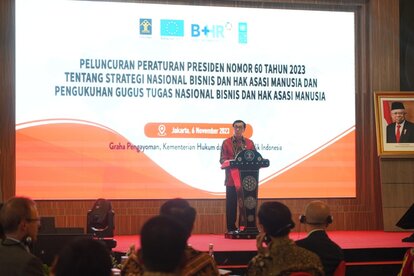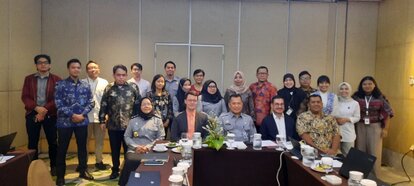Business and Human Rights
Harmonizing Prosperity and Humanity: A Blueprint for Advancing Business and Human Rights in Indonesia

Business is an important sector for a country’s economy, because it is through business practices that the economic sector can run, and improve the welfare of society. However, it is crucial to acknowledge that the implementation of business practices may potentially lead to various human rights violations. The world of business and human rights are two inseparable and interrelated links, which means there is a potential for the occurrence of human rights violations in that relationship. Therefore, it is imperative to apply human rights principles in the business process.
The intersection of business and human rights has been a topic of conversation globally. On the issue of human rights and transnational corporations and other business entities, the Special Representative of the UN Secretary-General developed the United Nations Guiding Principles on Business and Human Rights (UNGPs on BHR). The Special Representative included the Guiding Principles in his final report to the Human Rights Council. The Human Rights Council subsequently endorsed the Guiding Principles in Resolution 17/4 of June 16, 2011.
The UNGPs on BHR stands as a document providing guidance for both States and corporations to address and alleviate human rights violations within the business sector.
The UNGPs on BHR have three main pillars. The first pillar, state duty to protect is the government’s obligation to protect human rights. States are the main parties in protecting their citizens from human rights violations, both within their territory and/or jurisdiction by third parties.
The second pillar, business responsibility to respect is the responsibility of companies to respect human rights. The UNGPs on BHR expect companies to proactively ensure and prevent adverse impacts on human rights in their business practices.
Lastly, the third pillar, access to remedy is the fulfillment of the victim’s right to access remedy. This document emphasizes the protection of victims by ensuring victims get recovery or assistance. As one of the pillars, ensuring access to remedies needed by victims is the duty of both the State and the companies. Not only does access exist but it is also a collective responsibility to ensure its effectiveness and ease of availability for everyone.
Corporations and Human Rights in Indonesia
Corporations are the second most complained-about party to Komnas HAM (National Commission on Human Rights), although there have been fluctuations in the number over the past three years. Data shows that from 2019 to September 2021, Komnas HAM has received 1,366 complaints related to alleged human rights violations committed by corporations. The number of cases with corporate defendants in 2019 was 435 files, 455 files in 2020, and 428 files in 2021. Commonly, the issues are related to agrarian, labor, and environmental matters, violating rights such as land ownership, welfare, and the right to life (environment). These data shows that the issue resulted from business and human rights is a serious problem that must be resolved.
This situation shows that the existence of companies in Indonesia has an impact on human rights. Both the government, specifically the State, and companies must work collaboratively to mitigate the risks, potential, and impacts that may arise from business practices.
Thus far, most business entities still lack complete awareness regarding the availability of guidelines associated with the implementation of Business and Human Rights. These guidelines can actually serve as a tool to promote heightened awareness and responsibility in upholding human rights within their business activities. Business entities seem to operate their corporations without recognizing the imperative to adhere to human rights principles in their conduct. This has the potential to serve as a precursor to diverse manifestations of human rights violations within the business realm.
Issuance of Presidential Regulation No. 60 Year 2023 on National Business and Human Rights Strategy
On September 26, 2023, the Government of Indonesia issued a Presidential Regulation Number 60 Year 2023 on the National Strategy for Business and Human Rights. This regulation serves as a guideline for ministries/institutions and regional governments to plan, implement, and monitor business and human rights practices. It also contains guidelines for businesses and other stakeholders to participate in respecting human rights in the business sector. This regulation is poised to stimulate a competitive business climate in Indonesia that remains based on the respect for human rights.
The ratification of the Presidential Regulation No. 60 Year 2023 makes Indonesia the eighth country in Asia after Thailand, South Korea, Japan, Taiwan, Pakistan, Mongolia, and Vietnam and the third country in ASEAN after Thailand and Vietnam to have National Action Plans (NAPs) on Business and Human Rights (BHR).
According to the regulation, the National Strategy for Business and Human Rights is a national policy direction that contains strategies and steps used as a reference for Ministries, Institutions, Local Governments, Business Entities, and Other Stakeholders for the advancement of the business world with due regard to the protection, respect, and restoration of human rights. The National Strategy on Business and Human Rights is expected to create a more integrated, focused, impactful, and measurable policy on business and human rights, supported by continuous and transparent evaluation and supervision, as well as fostering a more intensive coordination between ministries and government institutions and business entities with the community. The strategy is also expected to contribute in preventing and overcoming the potential impact of business activities on human rights and providing effective remedies for affected victims.
At the inauguration of the Presidential Regulation No. 60 Year 2023, Minister of Law and Human Rights, Prof. Yasonna Hamonangan Laoly, S.H., M.Sc., Ph.D., stated that good governance in the business world could not be separated from the responsibility to respect human rights. As a result, Indonesia joined the ranks of nations embracing the United Nations Guiding Principles on Business and Human Rights (UNGPs on BHR). Additionally, he stated that the National Strategy for BHR is tangible, comprising comprehensive directives for both central and regional government bodies to integrate business and human rights effectively. Also present was the Coordinating Minister for Political, Legal, and Security Affairs, Prof. Dr. Mahfud, MD, asserted that the adoption of the National Strategy on BHR reflects the government’s dedication to actualizing the respect and safeguarding of human rights, particularly within the business sector.
The National Strategy on Business and Human Rights can also improve the competitiveness of the Indonesian business sector at the global level. Therefore, after the inauguration of the National Task Force on Business and Human Rights (GTN BHAM), the Ministry of Law and Human Rights is expected to promptly promote the establishment of the Regional Task Force for Business and Human Rights (GTD BHAM). Additionally, he extended an invitation to all parties to collectively pledge their commitment to fostering businesses in Indonesia that align with human rights principles.

Minister of Law and Human Rights, Prof. Yasonna Hamonangan Laoly, S.H., M.Sc., Ph.D. at the inauguration of the Presidential Regulation No. 60 Year 2023.
Follow-up Direction of Presidential Regulation Number 60 Year 2023
Presidential Regulation No. 60 Year 2023 encompasses a range of strategies designed to tackle challenges and hurdles related to business and human rights issues. Some of these strategies involve:
- Enhancing awareness, capacity, and advocacy for business and human rights among all stakeholders;
- Formulating regulations, policies, and guidelines that bolster the safeguarding and respect of human rights; and
- Reinforcing robust mechanisms for the effective redress of individuals affected by alleged human rights violations in the course of business activities.
In an effort to carry out the various strategies above, the Ministry of Law and Human Rights followed up by taking various steps to accelerate the implementation of business and human rights. The initial step taken was to prepare derivative regulations of Presidential Regulation No. 60 Year 2023 concerning the National Strategy for Business and Human Rights, one of which is the Ministry of Law and Human Rights Regulations (PermenkumHAM) which regulates the mechanism and work procedures related to the National Task Force and Regional Task Force for Business and Human Rights. It is anticipated that the PermenkumHAM can expedite the execution of the national strategy and promote the integration of business and human rights into mainstream practices.
In the appendix of Presidential Regulation No. 60 Year 2023 concerning Business and Human Rights Action, it is mentioned that during the formulation of the National Business and Human Rights Strategy, the Ministry of Law and Human Rights established the National Task Force on Business and Human Rights (GTN BHAM) in 2021 based on Minister of Law and Human Rights Decree No. M.HH-01.HA.01.07 of 2021. This task force comprises 20 ministries/institutions, representatives from community organizations, business associations, and academic experts. With this PermenkumHAM draft, it is expected to enable an enhance for GTN BHAM in refining its structure, responsibilities, and functions, as well as incorporating additional ministries/institutions closely tied to the National Business and Human Rights Strategy.
To implement the slogan “Respect, Protection, Fulfillment, Enforcement, and Promotion of Human Rights” or PSHAM, on the regional level government there is a Regional Task Force on Business and Human Rights (GTD BHAM) that consisted of provincial-level regional apparatus organizations, vertical agencies of the ministry that organizes government affairs in the field of law and human rights, and non-governmental partners.
PRISMA as a Human Rights Due Diligence Tool for Business Entities
Human Rights Due Diligence involves evaluating potential and actual human rights consequences arising from business operations, followed by incorporating and implementing mitigation measures based on the identified issues. It also serves as a mechanism for companies to acknowledge the presence of a human rights policy within the organization. This process includes assessing the impact of company activities on human rights, monitoring and reporting performance, and establishing a complaint mechanism for alleged human rights violations committed by the company, whether directly or indirectly.
In fulfilling the duty to protect, States should provide effective guidance to business enterprises on how to respect human rights in the conduct of their operations. Such guidance should advise on appropriate methods, including human rights due diligence, and how to effectively consider issues of gender, vulnerability and/or marginalization, recognizing the particular challenges that may be faced by indigenous peoples, women, ethnic or national minority groups, religious or linguistic minorities, children, persons with disabilities and migrant workers and their families.
In conducting due diligence, instruments or tools are needed that can be used by business actors, one of the tools available in Indonesia is PRISMA. PRISMA is an independent application program intended to assist companies in analyzing the risks of human right violations caused by business activities. PRISMA is a web-based application launched by the Directorate General of Human Rights (DitjenHAM) and is related to Business and Human Rights Risk Assessment.
There are 4 (four) objectives of PRISMA, namely facilitating all companies in all business sectors, large and small, to self-assess by establishing follow-up plans from the research results; tracking the implementation of follow-up actions; mapping the real conditions of operational impacts or business risks on human rights; and communicating the various series carried out to the public.
PRISMA serves as an educational tool for businesses, providing them with insights into diverse aspects of business and human rights. Additionally, it functions as a benchmark to evaluate the understanding of business actors in implementing human rights principles. Furthermore, PRISMA acts as a communication platform, fostering dialogue among business entities themselves and between business entities and the government.
As of November 3, 2023, 231 companies have utilized the PRISMA application for self-assessment. This data reveals a widespread eagerness among companies to assess their adherence to human rights principles in their operations. These businesses demonstrate a proactive approach, willingly identifying shortcomings and actively pursuing continuous improvements.
Collaborative Activities of FNF (Friedrich Naumann Foundation) Indonesia and KemenkumHAM
FNF Indonesia plays a crucial role in supporting the Directorate General of Human Rights under the Ministry of Law and Human Rights in the implementation of policies related to human rights protection and enforcement in Indonesia. The organization has actively contributed to the formulation and discussions leading to the approval of Presidential Regulation No. 60 Year 2023 on the National Strategy for Business and Human Rights. FNF's steadfast support extends until the decree is passed, ensuring its effective implementation for the integration of business and human rights into mainstream practices.
In 2023, FNF Indonesia engaged in collaborative initiatives with the Directorate General of Human Rights, demonstrating its commitment to human rights. These initiatives included supporting the establishment of the Business and Human Rights Regional Task Force in several provinces, such as Aceh, Lampung, Semarang, Bali, West Sulawesi, and Central Sulawesi. The inauguration of the Regional Task Force on Business and Human Rights (GTD BHAM) serves as a significant step in expediting the implementation of the National Strategy for Business and Human Rights at the regional level.
The Regional Task Force on Business and Human Rights is charged with coordinating endeavors to align business practices with human rights principles, in accordance with the mandates of the Ministry of Law and Human Rights. Each Regional Office at the provincial level assumes a crucial role in supervising business activities to ensure compliance with human rights standards. This undertaking emphasizes the government's dedication to expediting the integration of Business and Human Rights, reflecting its clear intention and collective actions to confront human rights violations within the business sector.

Team photo after Focus Group Discussion with attendees from Friedrich Naumann Foundation Indonesia and Directorate General Human Rights Indonesia (30/10/2023).
In reference to the activity, Dr. Dhahana Putra, Bc.IP., S.H., M.Si., the Director General of Human Rights, who was present to inaugurate the event, remarked that the Presidential Regulation on the National Strategy for Business and Human Rights serves as a catalyst for the implementation of such principles in Indonesia. He emphasized the need to expedite the effectiveness of both the National Task Force (GTN) and the Regional Task Force (GTD) on Business and Human Rights in response to the Presidential Regulation. FNF's invaluable support for this initiative was acknowledged with full appreciation, recognizing the organization as a steadfast partner consistently collaborating with the government in mainstreaming business and human rights in the country.
-------------
Written by Serafica Kartikadjati, Cooperation Analyst Directorate General Human Rights Indonesia.
Edited and Translated by Rania Rizkiadinda, Communications Officer FNF Indonesia.

